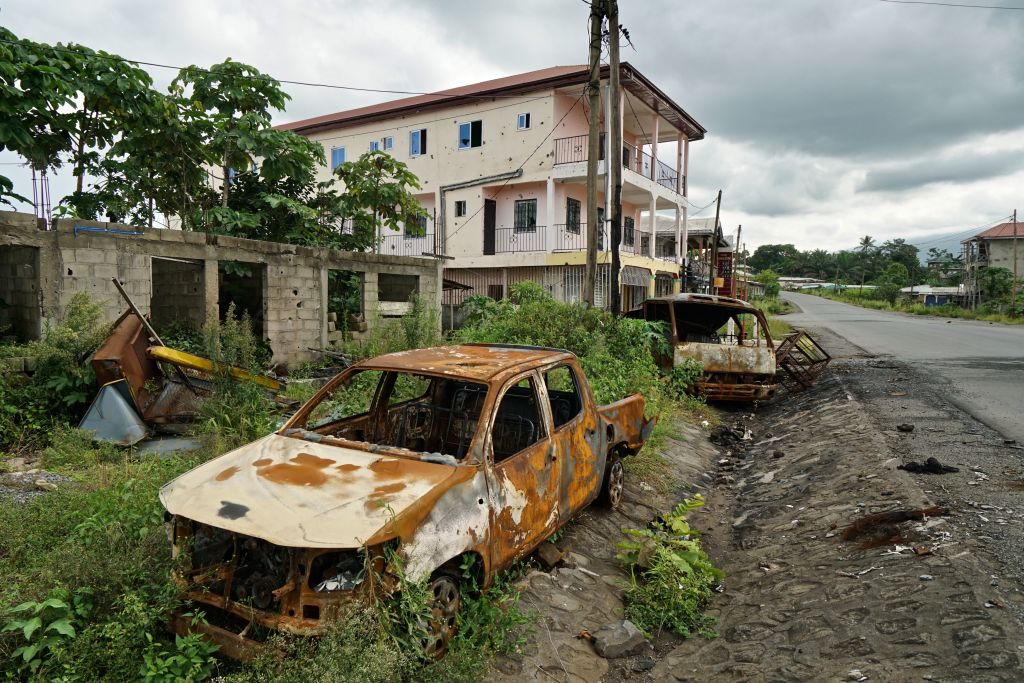Cameroon’s Anglophone Rebellion Threatens Regional Stability
ADF STAFF
It was after midnight on December 8, 2023, when armed rebels from Cameroon’s English-speaking separatist movement raided the border community of Belegete, firing guns and kicking in doors.
Muwah Augustine was visiting his parents when men broke into their house.
“I was asleep when the terror group arrived in the night, shooting sporadically at people,” Augustine told HumAngle. “They collected our phones, broke them and gave us the worst beating of our lives.”
Three days later, Augustine still was searching for his parents, who vanished during the mayhem.
Belegete is a border community without a checkpoint where people flow freely between southern Cameroon and eastern Nigeria. If Cameroon’s Anglophone rebels got their way, the community would become part of their desired nation of Ambazonia, named for Ambas Bay on the eastern Gulf of Guinea, and taking in Cameroon’s two English-speaking provinces.
For now, however, the rebellion against the French-speaking government in Yaoundé has led to destruction across the provinces and the threat of increasing political and economic insecurity across West and Central Africa.
Once known as Southern Cameroons, the South West and North West provinces started out in 1961 as autonomous regions in a federal system with the rest of Francophone Cameroon. In 1972, a new constitution eliminated that autonomy and brought the Southern Cameroons into a single state under Francophone control.
The current rebellion began in 2016 when lawyers and teachers protested what they described as years of discrimination by the Francophone government. Rebels say that, for decades, President Paul Biya’s government has forced Anglophone citizens to do their schooling and interact with government officials solely in French.
Biya’s attempt to put down protests by force sparked the fighting that continues today. For some the rebellion has hardened opposition to any further ties with the French-speaking provinces.
“We believe that annexation is a crime,” self-styled Ambazonian leader Samuel Ikome Sako said during a 2023 statement.
So far, 6,000 people have died in the conflict. Recently, Ambazonian violence has begun to spill over into neighboring parts of Nigeria, where more than 70,000 Cameroonian citizens have fled for safety. Entire communities have been abandoned.
Sako has said his group is open to a negotiated settlement. He called on his group’s supporters to do more to resolve the conflict between the Anglophone provinces and the central government.
Seven years after it began, the Anglophone rebellion has made little progress. Rebel groups are small and organized along ethnic lines. They rely on donations sent from abroad and have not been able to take and hold any territory in the region. Therefore, they resort to hit-and-run raids like the one on Belegete.
“The conflict has stalled because the rebels lack the numbers, money and cohesion to move beyond an insurgency. This makes a rebel victory impossible,” analyst Manu Lekunze wrote recently in The Conversation.
Although Anglophone rebels might not achieve independence, their continued fighting and cross-border disruptions have the potential to degrade regional security, according to Lekunze.
Cameroon has the second-largest economy in Central Africa. It is a key hub for imports, telecommunications, and transportation for its landlocked neighbors Chad and the Central African Republic, and Equatorial Guinea and Gabon.
“Multiple insurgencies can undermine the state and, therefore, continue to be national security threats,” Lekunze added. “Cameroon’s strategic location between West and Central Africa means insecurity in the country could destabilize the region.”


Comments are closed.